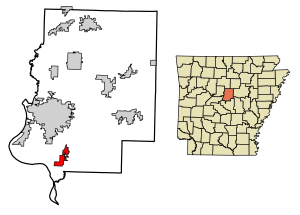Mayflower, Arkansas facts for kids
Quick facts for kids
Mayflower, Arkansas
|
|||
|---|---|---|---|
|
|||

Location of Mayflower in Faulkner County, Arkansas.
|
|||
| Country | United States | ||
| State | Arkansas | ||
| County | Faulkner | ||
| Area | |||
| • City | 4.05 sq mi (10.50 km2) | ||
| • Land | 3.94 sq mi (10.20 km2) | ||
| • Water | 0.12 sq mi (0.30 km2) | ||
| Elevation | 282 ft (86 m) | ||
| Population
(2020)
|
|||
| • City | 1,984 | ||
| • Density | 503.55/sq mi (194.44/km2) | ||
| • Metro | 748,031 | ||
| Time zone | UTC-6 (Central (CST)) | ||
| • Summer (DST) | UTC-5 (CDT) | ||
| ZIP code |
72106
|
||
| Area code(s) | 501 | ||
| FIPS code | 05-44750 | ||
| GNIS feature ID | 2405041 | ||
Mayflower is a city in Faulkner County, Arkansas, United States. In 2020, about 1,984 people lived there. This was a change from 2,234 people in 2010. Mayflower is part of the Central Arkansas area.
Contents
Discovering Mayflower's Past
Mayflower is a small city located near Conway and Little Rock. It sits on the edge of Lake Conway. The city is well-known for its great fishing spots. Many people who live in Mayflower enjoy a quiet, rural lifestyle. They can still easily drive to bigger cities for work or shopping. Mayflower officially became a town in Arkansas on March 6, 1928.
Early Settlers and Native Americans
The first European settlers arrived in the Mayflower area around 1778. These settlers were families like the Flannagins and Massengills. They moved west to avoid the American Revolutionary War. Before them, Native American tribes had lived in this region for hundreds of years. The Quapaw tribe was one of the main groups. Other native peoples also lived in this area, which is part of the Great Plains Cultural Area.
Farming and Local Economy
Like most of Arkansas, the land around Mayflower was once covered in thick forests. People cut down many trees for timber until the early 1900s. During the American Civil War, there were large cotton farms here. This was because the soil near the river was very rich. Later, these farms changed to modern farming methods. Today, farming is still a big part of the local economy. There are also some small businesses in Mayflower.
Important Events in Mayflower
Mayflower has experienced a few significant events in its recent history. These events show how the city has faced challenges and worked to recover.
2013 Oil Spill Incident
On March 29, 2013, an ExxonMobil pipeline broke near Mayflower. This pipeline was carrying heavy crude oil. Thousands of barrels of oil spilled into the area. Because of the spill, 22 homes had to be evacuated. The oil spill also caused a lot of damage to local properties and the environment. Cleanup efforts worked to fix the damage to the local ecosystem.
2014 Tornado Event
Mayflower was hit by a very strong tornado on April 27, 2014. This tornado was an EF4, which means it caused severe damage. It struck just before 8:00 p.m. The community worked together to recover after this powerful storm.
Exploring Mayflower's Geography
Mayflower is located in the southern part of Faulkner County. The main highway, Interstate 40, runs along the eastern side of the city. You can get to Mayflower from Exit 135, which is Arkansas Highway 89. Interstate 40 goes southeast about 20 miles (32 km) to Little Rock, the state capital. It also goes north about 10 miles (16 km) to Conway, which is the county seat of Faulkner County.
Mayflower covers a total area of about 4.05 square miles (10.5 square kilometers). Most of this area, about 3.94 square miles (10.2 square kilometers), is land. A smaller part, about 0.12 square miles (0.3 square kilometers), is water.
Mayflower's Population Over Time
| Historical population | |||
|---|---|---|---|
| Census | Pop. | %± | |
| 1930 | 188 | — | |
| 1940 | 165 | −12.2% | |
| 1950 | 293 | 77.6% | |
| 1960 | 355 | 21.2% | |
| 1970 | 469 | 32.1% | |
| 1980 | 1,381 | 194.5% | |
| 1990 | 1,415 | 2.5% | |
| 2000 | 1,631 | 15.3% | |
| 2010 | 2,234 | 37.0% | |
| 2020 | 1,984 | −11.2% | |
| U.S. Decennial Census | |||
Mayflower is part of a larger area called the Little Rock–North Little Rock–Conway Metropolitan Statistical Area. This means it's connected to the economy and community of these bigger cities nearby.
Population Details from 2020
The 2020 United States census counted 1,984 people living in Mayflower. There were 736 households and 480 families in the city. The table below shows the different groups of people living in Mayflower based on the 2020 census.
| Race | Number | Percentage |
|---|---|---|
| White (non-Hispanic) | 1,696 | 85.48% |
| Black or African American (non-Hispanic) | 122 | 6.15% |
| Native American | 9 | 0.45% |
| Asian | 6 | 0.3% |
| Pacific Islander | 1 | 0.05% |
| Other/Mixed | 111 | 5.59% |
| Hispanic or Latino | 39 | 1.97% |
See also
 In Spanish: Mayflower (Arkansas) para niños
In Spanish: Mayflower (Arkansas) para niños
 | John T. Biggers |
 | Thomas Blackshear |
 | Mark Bradford |
 | Beverly Buchanan |


